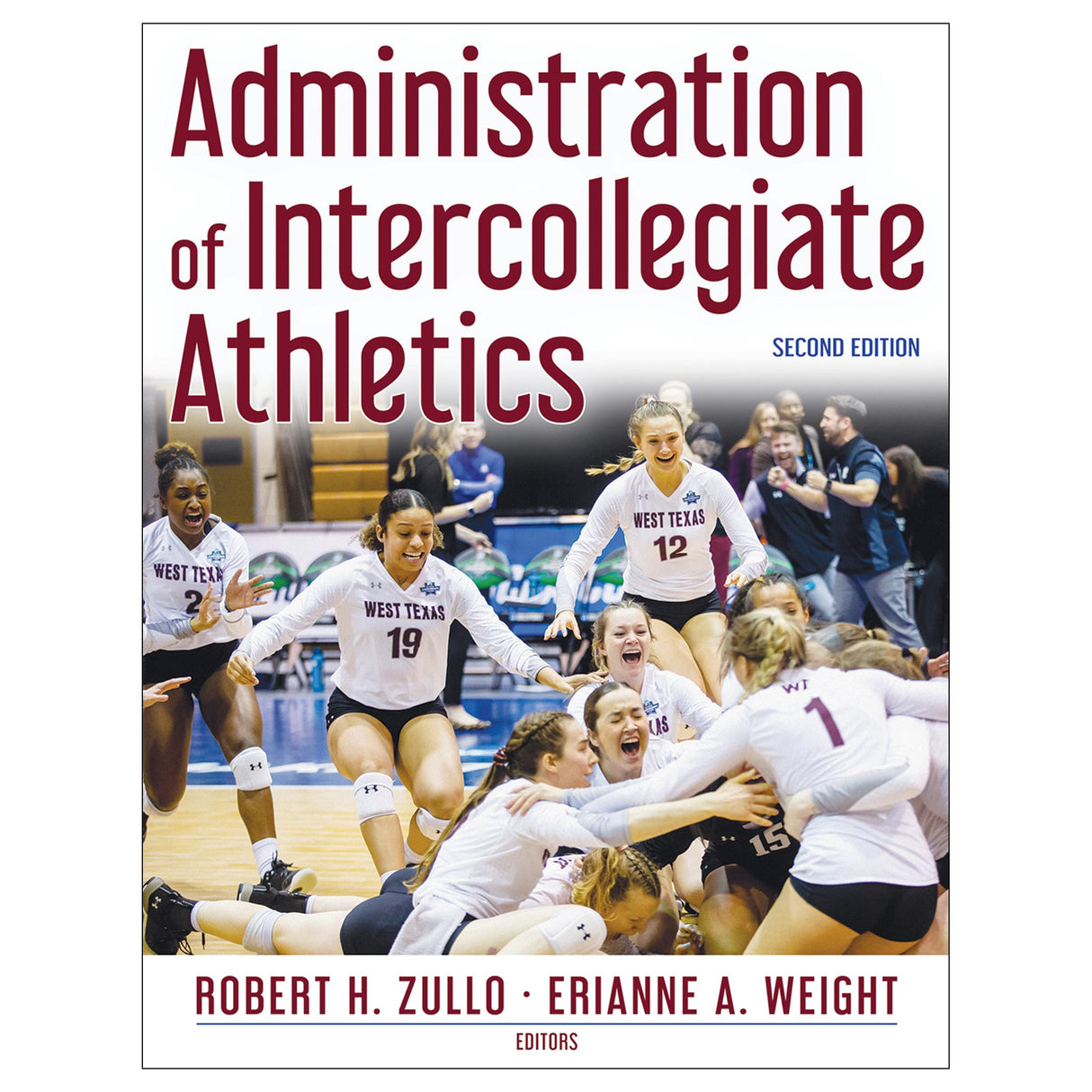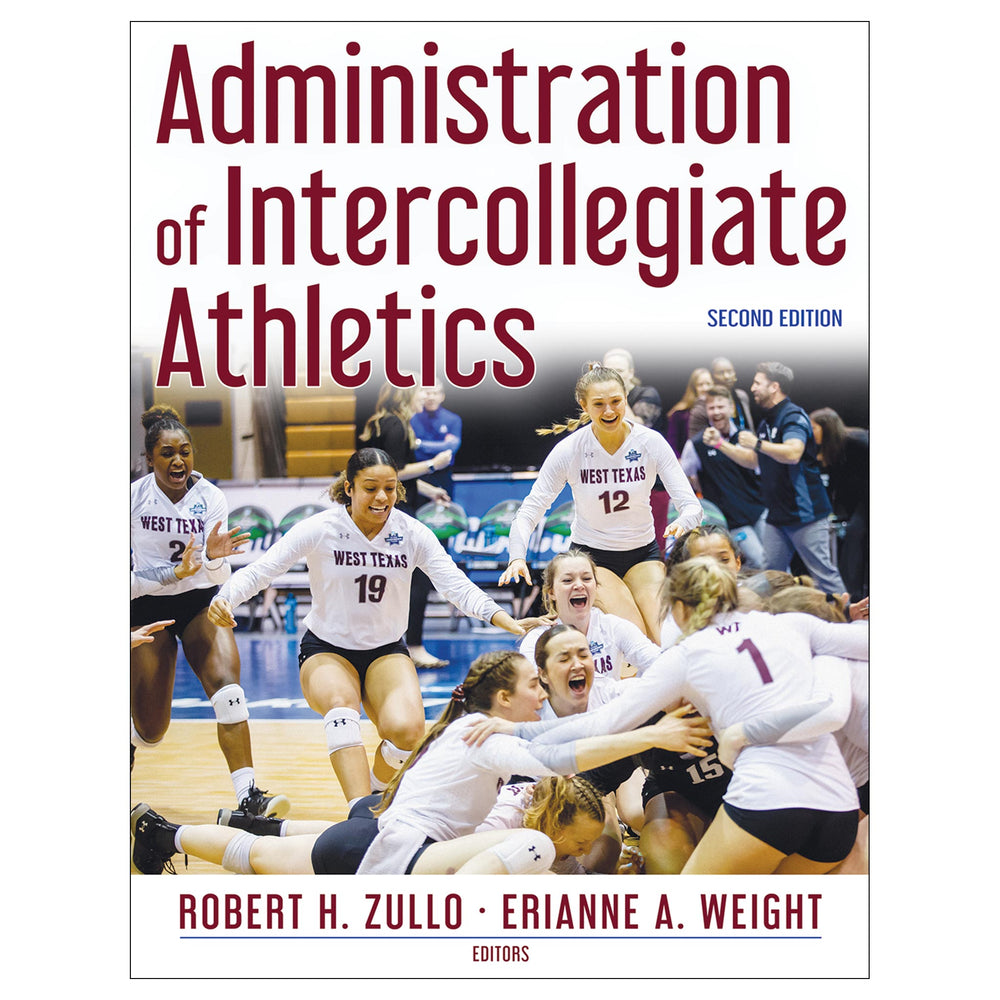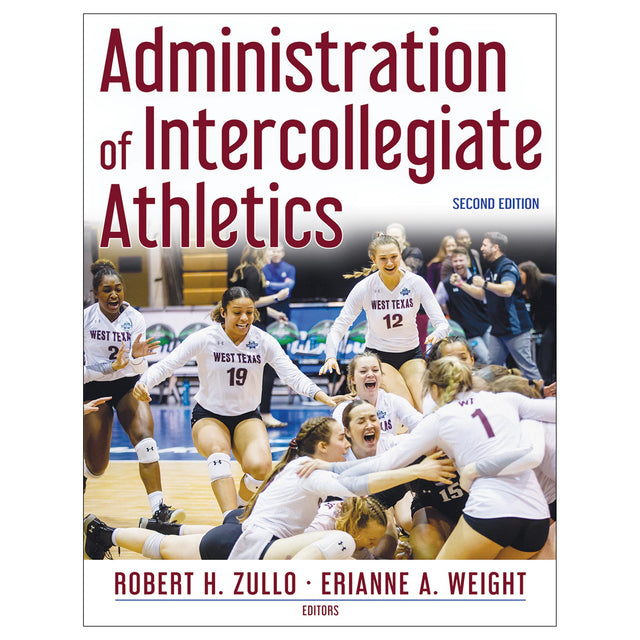Administration of Intercollegiate Athletics 2nd Edition epub
Author: Robert Zullo, Erianne Weight
$103.95 CAD
Access Duration: 10 Years
The growing complexities of the sport administrator’s role necessitate a college text that reflects the times. And that’s exactly what Administration of Intercollegiate Athletics, Second Edition, does. Some of the most informed and experienced professionals in the field of athletics administration have lent their expertise to the updated second edition, making it the most comprehensive resource available today for students aspiring to work in the field and for professionals navigating an increasingly demanding environment.
The text offers students a deep dive into the day-to-day operations of collegiate athletics departments. With chapters covering governing bodies and conference governance; leadership and management; rules compliance; academics, eligibility, and student-athlete development; media relations and production; financial operations and budgeting; marketing, ticketing, licensing, and sponsorships; facility and event management; alumni relations; and support services, the text provides students with the essential underpinnings of an athletics administration position.
New to this edition is a chapter dedicated to diversity, equity, and inclusion to provide broader discussions of athlete social justice activism, gender equity, Title IX compliance, feminist theory, and allyship. In addition, the second edition discusses the rise of NIL deals, legalized sports wagering, and esports, as well as the lasting financial impacts of COVID-19 on athletics departments at all levels of intercollegiate sport.
While Division I schools grab the spotlight, administrators in Division II, Division III, junior colleges, and National Association of Intercollegiate Athletics (NAIA) athletics departments share the same responsibilities as their Division I counterparts. Throughout the text, Administration of Intercollegiate Athletics, Second Edition, takes care to address the needs and concerns of administrators at these levels, even more so than in the previous edition.
New and updated features include Leadership Lesson sidebars, discussion questions, learning activities, and case studies designed to enhance learning and provide practical application of the concepts presented. Also included are Industry Profile sidebars that highlight prominent athletics administrators, Technology Tools sidebars that showcase the latest advancements assisting administrators in their roles, and Professional Development sidebars that provide students with direction on how to enter and succeed in the industry.
Administration of Intercollegiate Athletics, Second Edition, is an essential textbook for courses on intercollegiate athletics, sport management, or sport marketing and is a relied-on resource for current sport administrators.
Audience
Textbook for upper-level undergraduate and graduate students in sport management courses; reference for athletics administrators or anyone interested in the complex dynamics of intercollegiate athletics.Ellen J. Staurowsky
Higher Education and Student Experience in 19th-Century America
The NCAA and the Foundations of a College Sport Governance Structure
Democratization of College Sport
Women’s College Sport: Entrepreneurs Versus Educators
Conclusion
Learning Aids
Chapter 2. Governing Bodies
Barbara Osborne, Erianne A. Weight, and Robert H. Zullo
Institutional Control
Internal and External Stakeholders
Conference Governance
NCAA Governance Structure
Conclusion
Learning Aids
Chapter 3. Leadership and Management
Erianne A. Weight and Robert H. Zullo
Leadership
Management
Communication and Leadership
Conclusion
Learning Aids
Chapter 4. Compliance
Molly P. Harry, Erianne A. Weight, and Robert H. Zullo
Institutional Control
Rules, Compliance, and Accountability
Conclusion
Learning Aids
Chapter 5. Diversity, Equity, and Inclusion
Joseph N. Cooper, Molly P. Harry, Erianne A. Weight, and Barbara Osborne
History and Evolution of Diversity, Equity, and Inclusion in Intercollegiate Athletics
Black Athlete Experiences
Recent Trends in Athlete Social Justice Activism
Gender Equity
Title IX Compliance
Feminist Theory
Conclusion
Learning Aids
Chapter 6. Academics, Eligibility, and Student-Athlete Development
Sally R. Ross, Lisa M. Rubin, and Erianne A. Weight
Standards for Initial Academic Eligibility
Standards for Recruitment
Continuing Eligibility Standards
Athletics Academic Advising
Student Development Programming
Conclusion
Learning Aids
Chapter 7. Media Relations
Robert H. Zullo
Publicity and Good Public Relations
Production of Media
Website Interactivity and Innovation
Generating Publicity
Evolution of the Media
Sensationalism
Media Policy
Media Training
Speculating Versus Forecasting
Crisis Management
Reputation
Social Media and Continuous Surveillance
Student-Athlete Privacy: FERPA and Medical Issues
Freedom of Information Act
Public Relations Campaigns
Current Issues
Conclusion
Learning Aids
Chapter 8. Financial Operations
Stephen L. Shapiro and Brendan Dwyer
Financial Distinctiveness of Intercollegiate Athletics
Organizational Structure Within Intercollegiate Athletics
Financial Configuration
Financial Operations
Financial Statements
Budgeting
Conclusion
Learning Aids
Chapter 9. Marketing: Tickets and Promotions
David J. Shonk and Alyssa T. Bosley
Marketing Intercollegiate Athletics
Advertising
Licensing
Marketing and Atmospherics
Community Relations
Outsourcing and Secondary Ticket Market
Dynamic Ticket Pricing
Promotion
Conclusion
Learning Aids
Chapter 10. Corporate Sponsorship
Robert H. Zullo
Platforms
Property
Compatibility and the Sales Process
Measurement and Ambush Marketing
Facility Naming Rights and Fair Market Value
Outsourcing and UBIT Taxes
Conclusion
Learning Aids
Chapter 11. Facility and Event Management
Robert H. Zullo
Event Management and Operations
Safety and Risk Assessments
Fan Rights
Facility Planning
Facility Budgeting
Facility Funding
Current Issues
Conclusion
Learning Aids
Chapter 12. Alumni Relations and Athletics Development
Robert H. Zullo
Cultivating Donors: Clubs, Associations, Foundations, and Societies
Broadening the Donor Base
Motivating Donors
Benefits of Giving: Priority Seating and Parking
Ways to Give
Growing Affinity: Clubs and Organizations Beyond Campus
Concerns With Fundraising
Current Issues
Conclusion
Learning Aids
Chapter 13. Support Services
Robert H. Zullo
Holistic Development Staff and Services
Sports Medicine
Digital Media Services
Equipment Services
Conclusion
Learning Aids
Erianne A. Weight, PhD, MBA, is the director of Center for Research in Intercollegiate Athletics and a professor of sport administration at the University of North Carolina (UNC) at Chapel Hill. She is involved in a variety of Division I athletics consultancies through her role as a research consultant for Collegiate Sports Associates. She is a former president of the North American Society for Sport Management (NASSM) and is chair of the UNC Faculty Athletics Committee. It is her hope that through research, there will be an increase in the quantity and quality of opportunities for athletic participation and education for young people throughout the world.
Mental health resources for student athletes
Television broadcasting deals in college athletics
All ancillaries are free to adopting instructors through HKPropel.
Test package. Contains nearly 400 questions in true-false, essay and short-answer, and multiple-choice formats. The files may be downloaded for integration with a learning management system or printed for use as paper-based tests. Instructors may also create their own customized quizzes or tests from the test bank questions.
Chapter quizzes. Contains ready-made quizzes (10 questions each) to assess student comprehension of the most important concepts in each chapter.
Presentation package. Features more than 250 PowerPoint slides of text, artwork, and tables from the book that can be used for class discussion and presentation. The slides in the presentation package can be used directly within PowerPoint or printed to make handouts for students. Instructors can easily add, modify, and rearrange the order of the slides.





